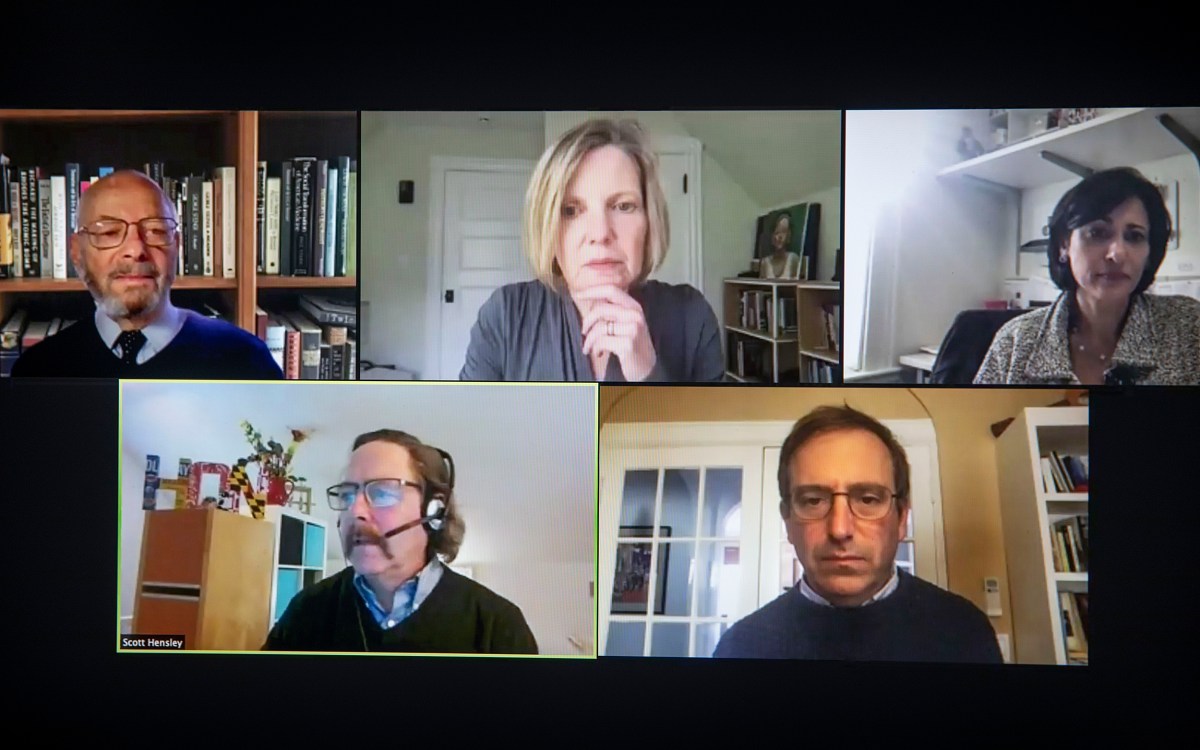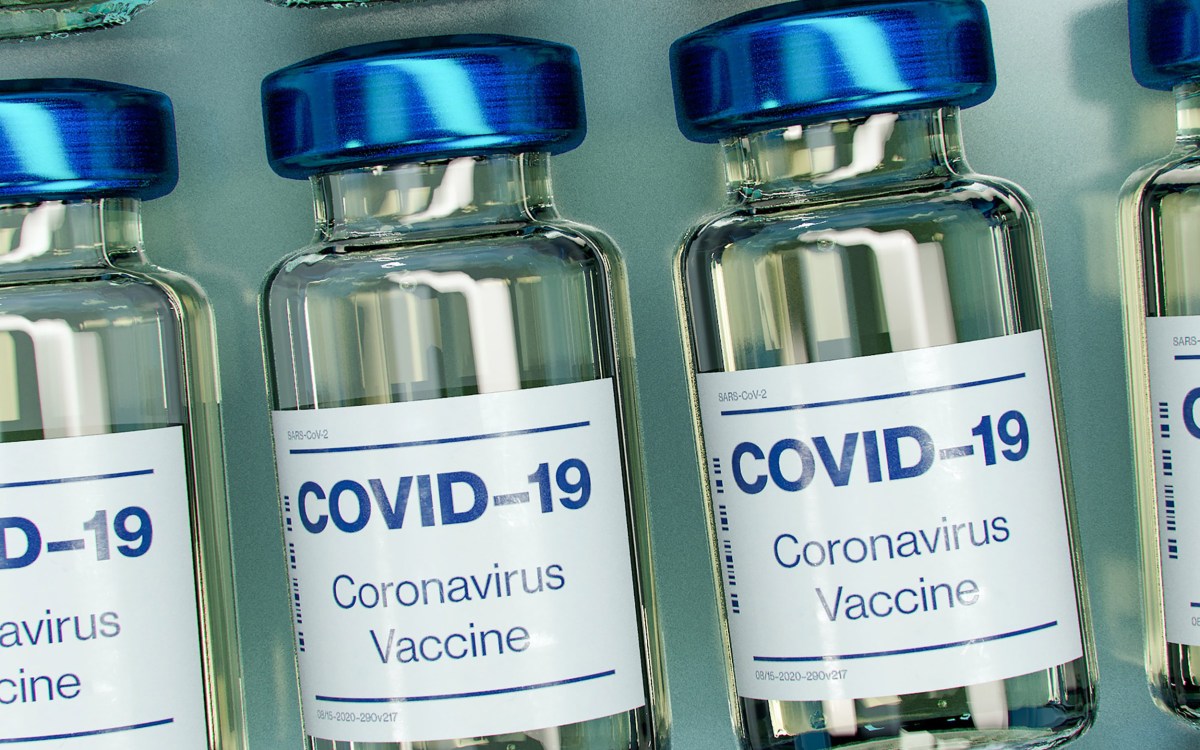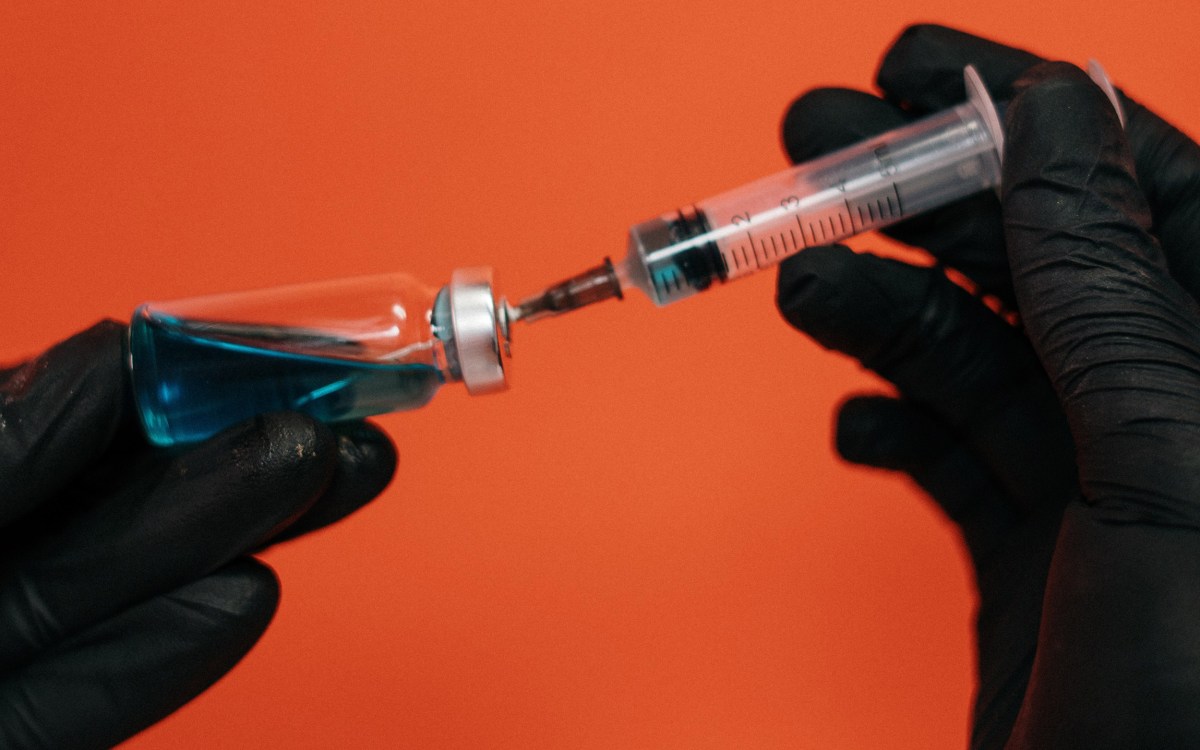
If 75 percent to 80 percent of Americans are vaccinated, then by the end of 2021, we can reach a degree of normality, said Anthony Fauci, director of the National Institute of Allergy and Infectious Diseases.
Rose Lincoln/Harvard Staff Photographer
Fauci says herd immunity possible by fall, ‘normality’ by end of 2021
Experts detail vaccine unknowns, need to continue masking, distancing
The nation’s top infectious disease doctor offered a timeline for ending the COVID-19 pandemic this week, saying that if the coming vaccination campaign goes well, we could approach herd immunity by summer’s end and “normality that is close to where we were before” by the end of 2021.
Anthony Fauci, director of the National Institute of Allergy and Infectious Diseases, said on Wednesday that that estimate is dependent on significant numbers of Americans being willing to be inoculated with one of several vaccines in various stages of development. If 75 percent to 80 percent of Americans are vaccinated in broad-based campaigns likely to start in the second quarter of next year, then the U.S. should reach the herd immunity threshold months later. If vaccination levels are significantly lower, 40 percent to 50 percent, Fauci said, it could take a very long time to reach that level of protection.
“Let’s say we get 75 percent, 80 percent of the population vaccinated,” Fauci said. “If we do that, if we do it efficiently enough over the second quarter of 2021, by the time we get to the end of the summer, i.e., the third quarter, we may actually have enough herd immunity protecting our society that as we get to the end of 2021, we can approach very much some degree of normality that is close to where we were before.”
Fauci spoke at an online “When Public Health Means Business” event sponsored by the Harvard T.H. Chan School of Public Health and the New England Journal of Medicine. He addressed an array of topics from how he handles frustration over people who refuse basic, life-saving, public health measures, to why masks will continue to be needed even after vaccination starts (the vaccines haven’t yet been shown to stop transmission).
“As a public health official … it would be unconscionable to walk away from this or to throw up your hands in frustration,” Fauci said. “It’s not about me and how I feel; it’s about what the problem is. And the problem is enormous. … You just have to suck it up and keep going.”
Fauci was introduced by Chan School Dean Michelle Williams, who said the level of noncompliance with basic and straightforward public health measures makes her think the nation has become numb to COVID-related illness and death. That could be a dangerous thing, she said, if it translates into an unwillingness to take a vaccine. Recent Pew surveys, she said, indicate that Americans who say they would take the vaccine rose to 60 percent in November from 51 percent in September, a figure that’s nonetheless dangerously low if the goal is to reach levels high enough to virtually stop the transmission and end the pandemic.
“Saving lives is now a race against the clock. Let each of us … do the right thing,” Williams said, “because we simply cannot afford to go numb.”
The afternoon event was the second at Harvard on Wednesday focused on COVID vaccines. The first, hosted by the Harvard Medical School-led Massachusetts Consortium on Pathogen Readiness, or MassCPR, featured several experts on various aspects of the pandemic discussing vaccine trials and distribution efforts, as well as health disparities and ways to reach minority communities and encourage vaccine acceptance.
“As a public health official … it would be unconscionable to walk away from this or to throw up your hands in frustration. … You just have to suck it up and keep going.”
Anthony Fauci
More like this
HMS Dean George Daley, who hosted the MassCPR event, said that successful development and deployment of COVID-19 vaccines show “science, medicine, and public health at its best” but warned that overconfidence about a preventative treatment can be as dangerous as mistrust.
“Vaccine mistrust is dangerous, but so is overconfidence,” Daley said. “We need to be wary of the dangers of magical thinking, of seeing vaccines as a silver bullet. Vaccines will not offer an overnight solution. We have to temper our optimism with a dose of reality and brace ourselves for many more months of infection prevention and distancing measures as the vaccines are rolled out.”
Experts discussed the news of adverse reactions to the Pfizer vaccine that had been thought to be overwhelmingly safe. British authorities on Wednesday recommended that people prone to severe allergic reactions avoid the treatment, which this week became the first approved for distribution after the conclusion of clinical trials in a Western nation. Two British health care workers who were inoculated early developed severe allergic reactions. Also on Wednesday, Canada approved the vaccine for distribution, while on Thursday, a U.S. Food and Drug Administration advisory panel endorsed the Pfizer vaccine for U.S. distribution, with final approval expected soon.
Both Fauci and experts at the MassCPR event said that rare, serious side effects like the allergic reactions sometimes occur once a vaccine is widely distributed because it reaches many more people than a clinical trial, including some with health issues or genetic profiles that make them susceptible to severe reactions. That’s why vaccines are monitored even after they go out to the general population. That’s also partly why the U.S. is backing multiple vaccine efforts, in hopes that rare side effects observed with one vaccine will be absent with another, Fauci said.
“These are the kinds of things that happen when you implement large vaccine programs,” Fauci said. “You’re talking about millions of individuals getting vaccinated, so you may start seeing effects in some that might not have been picked up when you were dealing with thousands.”
The allergic reactions did not prompt a recommendation to halt vaccinations, but rather to heighten vigilance so that people prone to severe allergic reactions not take the vaccine or take it only with medical help nearby in case a severe reaction occurs.
Former Food and Drug Administration Commissioner Margaret Hamburg, who appeared at the MassCPR event, said a key ethical question emerging as the U.S. moves toward vaccine approval will be whether to offer the vaccine to those enrolled in the clinical trials’ placebo group. On one hand, she said, early trial results have shown the vaccine to be more effective than hoped for and vaccination — particularly of those at high risk — might be desired. But on the other hand, important questions about the duration of the vaccine’s protection and about late-emerging side effects might be answered if the trial runs its planned two years. Inoculating those in the placebo arm of the trial would eliminate an unvaccinated population against which to compare the vaccinated participants’ results.
Another unanswered question is whether the vaccines, whose trials have shown that they prevent people from getting seriously ill and dying of COVID-19, also prevent people from becoming infected in the first place and, importantly, from passing the virus on to others. It could be the case, Fauci said, that even if the vaccines don’t prevent infection, they keep virus levels so low that they do prevent transmission. Those outstanding questions, however, are why masking, distancing, and other public health measures will be needed even by people who have been vaccinated until we know the answers.
“We’re going to find out from follow-up studies,” Fauci said. “We should not say that vaccines are a substitution for public health measures; [they’re] a complement to public health measures.”








